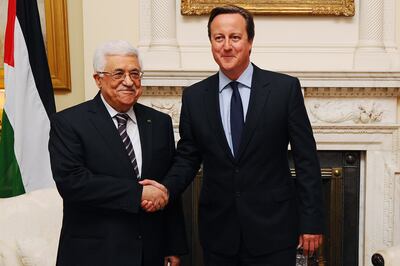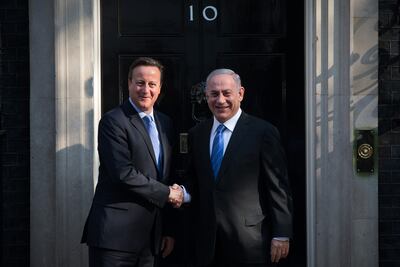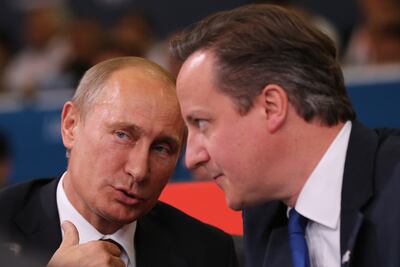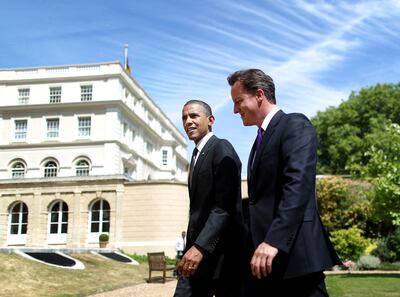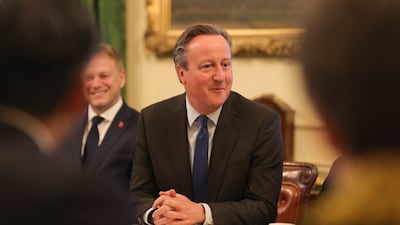Live updates: Follow the latest news on Israel-Gaza
David Cameron, the former UK prime minister who has taken up the role of Foreign Secretary, has entered a very different environment than the one he left seven years ago, facing a world riven by grave foreign policy issues.
Foremost among the questions he will be asked is whether he can deliver a Middle East-heavy policy as the region teeters on the edge of catastrophe amid the Israel-Gaza war.
In a signal of Mr Cameron's intent, on his first day in office in a co-ordinated move with the US, he imposed a round of sanctions on the Hamas leadership.
The package of travel bans, asset freezes and arms embargoes are aimed at six people including Yahya Sinwar, Hamas’s political leader, and Mohammed Deif, its military commander.
“We will continue to use every tool at our disposal to disrupt the abhorrent activity of this terrorist organisation making it harder for them to operate and isolating them on the world stage,” Mr Cameron said in a statement.
“The Palestinian people are victims of Hamas, too. We stand in solidarity with them and will continue to support humanitarian pauses to allow significantly more life-saving aid to reach Gaza.”
The stringent measures have been placed on the Hamas leadership to “disrupt the group’s acts of terror”, the statement added.
If Mr Cameron is to help in the Middle East, then he is starting with the advantage: he is personally known to key leaders in the region, including Israel’s Benjamin Netanyahu and Mahmoud Abbas of the Palestinian Authority.
The British government’s hardening language around the humanitarian pause and aid to Gaza will be immediate objectives for the new Foreign Secretary to pursue and one that analysts believe he is well equipped to tackle.
Prime Minister Rishi Sunak said on Monday evening that Britain had doubled its aid to Gaza while pressing Israel directly “for unhindered humanitarian access and urgent and substantive humanitarian pauses” with “aid coming in by land, air and sea”.
“Crucially David Cameron has the right standing with Israelis but also, he's balanced that out with a good relationship with key Middle Eastern states, particularly in the Gulf,” said Shayan Talabany, a senior analyst at the Tony Blair Institute.
That Mr Cameron has previously labelled Gaza a “prison camp” and appealed to the Israelis to allow the flow of goods and people into and out of the enclave will also play in his favour.
But critically, while prime minister, he was pro-Israel while also speaking out against anti-Semitism – “and a friend that will sometimes speak out against things that he sees, is critical”, said Ms Talabany.
Robin Gordon-Farleigh, Mr Cameron’s former communications strategist, told The National that his ex-boss’s extensive experience in the Middle East would be an advantage.
“That and his established close relationships with leaders in the region will make his approach as Foreign Secretary both informed and strategic,” he said.
Mr Cameron’s long-standing relationships with many countries will also be “a real asset” for Britain in dealing with key global issues, said Mr Gordon-Farleigh, founding partner of Manara Global, a UAE-based strategic communications agency.
“His grasp of international relations and the existing relationships he has with leaders should mean that Britain can make some serious advances in its foreign policy agenda in which David Cameron will be more ambitious in what can be achieved.”
That ambition will be significantly tested in the coming weeks as he flies out to conflict zones that will certainly include Israel and Ukraine.
But there are some who argue that his Middle East foreign policy failures from his time in office from 2010 to 2016 are not redolent of success.
Jeremy Black, a foreign policy commentator, argued that Mr Cameron was “too much of a lightweight” to make any significant impact, pointing to his foreign policy failures in Libya and Syria as well as Brexit.
“I don't think he ended his period in office having the respect of international leaders,” he said. “So I'm not sure that he can deliver very much while Britain is trying to claim an international role which it doesn't really have.”
He added that in his seven years out of frontline politics, Mr Cameron had not made any “keynote lectures of great consequence” outlining his foreign policy vision.
To a lesser extent, that view is shared by the former Iranian state hostage Ana Diamond, who said that her family’s plight was ignored by Mr Cameron as was that of Nazanin Zaghari-Ratcliffe.
“Cameron failed to take a strong stance while he was still in the office,” she said. “So it is difficult to ignore his past.”
But the Oxford University international affairs scholar argued that he still had “a legacy far greater than he is often given credit for” including warm relations with Arab states.
“What I am most anticipating to see is what he will bring to the table regarding the humanitarian catastrophe unfolding in Gaza,” added the former Young Conservative spokeswoman.
“He may have been regarded as the most pro-Israel British prime minister ever in the past, but he has also been openly critical about Israel's 'illegal' occupation in the West Bank and their blockade in Gaza.”
She also argued that his strong ties to Israel could help “find a way to a ceasefire” which was “more urgent than many in the government like to admit”, particularly given “the staggering number of Palestinian deaths”.
“I hope Cameron will have the political willpower and moral courage to do the right thing, not just with words but with actions.”
Key to those actions will be visiting the Palestinian Authority in the occupied West Bank, “given that they are the main players in the wider picture of the region”, said Ms Talabany.
That would need to be followed by an extensive trip around the Gulf states, including the UAE and Saudi Arabia, to build support for a viable postwar peace plan.
In those Middle East travels, argued Mr Gordon-Farleigh, the former prime would add his “incredibly valuable experience of having seen it and done it already” and a “deep understanding of the geopolitical landscape and insights into the complex dynamics of global politics”.
David Cameron appointed UK Foreign Secretary – in pictures
Brief scores:
Scotland 371-5, 50 overs (C MacLeod 140 no, K Coetzer 58, G Munsey 55)
England 365 all out, 48.5 overs (J Bairstow 105, A Hales 52; M Watt 3-55)
Result: Scotland won by six runs
Milestones on the road to union
1970
October 26: Bahrain withdraws from a proposal to create a federation of nine with the seven Trucial States and Qatar.
December: Ahmed Al Suwaidi visits New York to discuss potential UN membership.
1971
March 1: Alex Douglas Hume, Conservative foreign secretary confirms that Britain will leave the Gulf and “strongly supports” the creation of a Union of Arab Emirates.
July 12: Historic meeting at which Sheikh Zayed and Sheikh Rashid make a binding agreement to create what will become the UAE.
July 18: It is announced that the UAE will be formed from six emirates, with a proposed constitution signed. RAK is not yet part of the agreement.
August 6: The fifth anniversary of Sheikh Zayed becoming Ruler of Abu Dhabi, with official celebrations deferred until later in the year.
August 15: Bahrain becomes independent.
September 3: Qatar becomes independent.
November 23-25: Meeting with Sheikh Zayed and Sheikh Rashid and senior British officials to fix December 2 as date of creation of the UAE.
November 29: At 5.30pm Iranian forces seize the Greater and Lesser Tunbs by force.
November 30: Despite a power sharing agreement, Tehran takes full control of Abu Musa.
November 31: UK officials visit all six participating Emirates to formally end the Trucial States treaties
December 2: 11am, Dubai. New Supreme Council formally elects Sheikh Zayed as President. Treaty of Friendship signed with the UK. 11.30am. Flag raising ceremony at Union House and Al Manhal Palace in Abu Dhabi witnessed by Sheikh Khalifa, then Crown Prince of Abu Dhabi.
December 6: Arab League formally admits the UAE. The first British Ambassador presents his credentials to Sheikh Zayed.
December 9: UAE joins the United Nations.
GIANT REVIEW
Starring: Amir El-Masry, Pierce Brosnan
Director: Athale
Rating: 4/5
The Bio
Favourite vegetable: “I really like the taste of the beetroot, the potatoes and the eggplant we are producing.”
Holiday destination: “I like Paris very much, it’s a city very close to my heart.”
Book: “Das Kapital, by Karl Marx. I am not a communist, but there are a lot of lessons for the capitalist system, if you let it get out of control, and humanity.”
Musician: “I like very much Fairuz, the Lebanese singer, and the other is Umm Kulthum. Fairuz is for listening to in the morning, Umm Kulthum for the night.”
Other workplace saving schemes
- The UAE government announced a retirement savings plan for private and free zone sector employees in 2023.
- Dubai’s savings retirement scheme for foreign employees working in the emirate’s government and public sector came into effect in 2022.
- National Bonds unveiled a Golden Pension Scheme in 2022 to help private-sector foreign employees with their financial planning.
- In April 2021, Hayah Insurance unveiled a workplace savings plan to help UAE employees save for their retirement.
- Lunate, an Abu Dhabi-based investment manager, has launched a fund that will allow UAE private companies to offer employees investment returns on end-of-service benefits.
The%20specs
%3Cp%3E%3Cstrong%3EPowertrain%3A%20%3C%2Fstrong%3ESingle%20electric%20motor%0D%3Cbr%3E%3Cstrong%3EPower%3A%20%3C%2Fstrong%3E201hp%0D%3Cbr%3E%3Cstrong%3ETorque%3A%20%3C%2Fstrong%3E310Nm%0D%3Cbr%3E%3Cstrong%3ETransmission%3A%20%3C%2Fstrong%3ESingle-speed%20auto%0D%3Cbr%3E%3Cstrong%3EBattery%3A%20%3C%2Fstrong%3E53kWh%20lithium-ion%20battery%20pack%20(GS%20base%20model)%3B%2070kWh%20battery%20pack%20(GF)%0D%3Cbr%3E%3Cstrong%3ETouring%20range%3A%20%3C%2Fstrong%3E350km%20(GS)%3B%20480km%20(GF)%0D%3Cbr%3E%3Cstrong%3EPrice%3A%20%3C%2Fstrong%3EFrom%20Dh129%2C900%20(GS)%3B%20Dh149%2C000%20(GF)%0D%3Cbr%3E%3Cstrong%3EOn%20sale%3A%3C%2Fstrong%3E%20Now%3C%2Fp%3E%0A
How to wear a kandura
Dos
- Wear the right fabric for the right season and occasion
- Always ask for the dress code if you don’t know
- Wear a white kandura, white ghutra / shemagh (headwear) and black shoes for work
- Wear 100 per cent cotton under the kandura as most fabrics are polyester
Don’ts
- Wear hamdania for work, always wear a ghutra and agal
- Buy a kandura only based on how it feels; ask questions about the fabric and understand what you are buying
Who has lived at The Bishops Avenue?
- George Sainsbury of the supermarket dynasty, sugar magnate William Park Lyle and actress Dame Gracie Fields were residents in the 1930s when the street was only known as ‘Millionaires’ Row’.
- Then came the international super rich, including the last king of Greece, Constantine II, the Sultan of Brunei and Indian steel magnate Lakshmi Mittal who was at one point ranked the third richest person in the world.
- Turkish tycoon Halis Torprak sold his mansion for £50m in 2008 after spending just two days there. The House of Saud sold 10 properties on the road in 2013 for almost £80m.
- Other residents have included Iraqi businessman Nemir Kirdar, singer Ariana Grande, holiday camp impresario Sir Billy Butlin, businessman Asil Nadir, Paul McCartney’s former wife Heather Mills.
Hunting park to luxury living
- Land was originally the Bishop of London's hunting park, hence the name
- The road was laid out in the mid 19th Century, meandering through woodland and farmland
- Its earliest houses at the turn of the 20th Century were substantial detached properties with extensive grounds
Company%20profile
%3Cp%3EName%3A%20Tabby%3Cbr%3EFounded%3A%20August%202019%3B%20platform%20went%20live%20in%20February%202020%3Cbr%3EFounder%2FCEO%3A%20Hosam%20Arab%2C%20co-founder%3A%20Daniil%20Barkalov%3Cbr%3EBased%3A%20Dubai%2C%20UAE%3Cbr%3ESector%3A%20Payments%3Cbr%3ESize%3A%2040-50%20employees%3Cbr%3EStage%3A%20Series%20A%3Cbr%3EInvestors%3A%20Arbor%20Ventures%2C%20Mubadala%20Capital%2C%20Wamda%20Capital%2C%20STV%2C%20Raed%20Ventures%2C%20Global%20Founders%20Capital%2C%20JIMCO%2C%20Global%20Ventures%2C%20Venture%20Souq%2C%20Outliers%20VC%2C%20MSA%20Capital%2C%20HOF%20and%20AB%20Accelerator.%3Cbr%3E%3C%2Fp%3E%0A
Results
5.30pm: Maiden (TB) Dh82,500 (Dirt) 1,600m, Winner: Panadol, Mickael Barzalona (jockey), Salem bin Ghadayer (trainer)
6.05pm: Maiden (TB) Dh82,500 (Turf) 1,400m, Winner: Mayehaab, Adrie de Vries, Fawzi Nass
6.40pm: Handicap (TB) Dh85,000 (D) 1,600m, Winner: Monoski, Mickael Barzalona, Salem bin Ghadayer
7.15pm: Handicap (TB) Dh102,500 (T) 1,800m, Winner: Eastern World, Royston Ffrench, Charlie Appleby
7.50pm: Handicap (TB) Dh92,500 (D) 1,200m, Winner: Madkal, Adrie de Vries, Fawzi Nass
8.25pm: Handicap (TB) Dh92,500 (T) 1,200m, Winner: Taneen, Dane O’Neill, Musabah Al Muhairi
Labour dispute
The insured employee may still file an ILOE claim even if a labour dispute is ongoing post termination, but the insurer may suspend or reject payment, until the courts resolve the dispute, especially if the reason for termination is contested. The outcome of the labour court proceedings can directly affect eligibility.
- Abdullah Ishnaneh, Partner, BSA Law
RESULTS
5pm: Maiden | Dh80,000 | 1,600m
Winner: AF Al Moreeb, Tadhg O’Shea (jockey), Ernst Oertel (trainer)
5.30pm: Handicap | Dh80,000 | 1,600m
Winner: AF Makerah, Adrie de Vries, Ernst Oertel
6pm: Handicap | Dh80,000 | 2,200m
Winner: Hazeme, Richard Mullen, Jean de Roualle
6.30pm: Handicap | Dh85,000 | 2,200m
Winner: AF Yatroq, Brett Doyle, Ernst Oertel
7pm: Shadwell Farm for Private Owners Handicap | Dh70,000 | 2,200m
Winner: Nawwaf KB, Patrick Cosgrave, Helal Al Alawi
7.30pm: Handicap (TB) | Dh100,000 | 1,600m
Winner: Treasured Times, Bernardo Pinheiro, Rashed Bouresly
The chef's advice
Troy Payne, head chef at Abu Dhabi’s newest healthy eatery Sanderson’s in Al Seef Resort & Spa, says singles need to change their mindset about how they approach the supermarket.
“They feel like they can’t buy one cucumber,” he says. “But I can walk into a shop – I feed two people at home – and I’ll walk into a shop and I buy one cucumber, I’ll buy one onion.”
Mr Payne asks for the sticker to be placed directly on each item, rather than face the temptation of filling one of the two-kilogram capacity plastic bags on offer.
The chef also advises singletons not get too hung up on “organic”, particularly high-priced varieties that have been flown in from far-flung locales. Local produce is often grown sustainably, and far cheaper, he says.
Infiniti QX80 specs
Engine: twin-turbocharged 3.5-liter V6
Power: 450hp
Torque: 700Nm
Price: From Dh450,000, Autograph model from Dh510,000
Available: Now
Five famous companies founded by teens
There are numerous success stories of teen businesses that were created in college dorm rooms and other modest circumstances. Below are some of the most recognisable names in the industry:
- Facebook: Mark Zuckerberg and his friends started Facebook when he was a 19-year-old Harvard undergraduate.
- Dell: When Michael Dell was an undergraduate student at Texas University in 1984, he started upgrading computers for profit. He starting working full-time on his business when he was 19. Eventually, his company became the Dell Computer Corporation and then Dell Inc.
- Subway: Fred DeLuca opened the first Subway restaurant when he was 17. In 1965, Mr DeLuca needed extra money for college, so he decided to open his own business. Peter Buck, a family friend, lent him $1,000 and together, they opened Pete’s Super Submarines. A few years later, the company was rebranded and called Subway.
- Mashable: In 2005, Pete Cashmore created Mashable in Scotland when he was a teenager. The site was then a technology blog. Over the next few decades, Mr Cashmore has turned Mashable into a global media company.
- Oculus VR: Palmer Luckey founded Oculus VR in June 2012, when he was 19. In August that year, Oculus launched its Kickstarter campaign and raised more than $1 million in three days. Facebook bought Oculus for $2 billion two years later.
SPECS
%3Cp%3E%0D%3Cstrong%3EEngine%3A%3C%2Fstrong%3E%204.0-litre%20twin-turbo%20V8%0D%3Cbr%3E%3Cstrong%3EPower%3A%3C%2Fstrong%3E%20750hp%20at%207%2C500rpm%0D%3Cbr%3E%3Cstrong%3ETorque%3A%3C%2Fstrong%3E%20800Nm%20at%205%2C500rpm%0D%3Cbr%3E%3Cstrong%3ETransmission%3A%3C%2Fstrong%3E%207%20Speed%20dual-clutch%20auto%0D%0D%3Cbr%3E%3Cstrong%3ETop%20speed%3A%3C%2Fstrong%3E%20332kph%0D%3Cbr%3E%3Cstrong%3EFuel%20consumption%3A%3C%2Fstrong%3E%2012.2L%2F100km%0D%3Cbr%3E%3Cstrong%3EOn%20sale%3A%20%3C%2Fstrong%3EYear%20end%0D%3Cbr%3E%3Cstrong%3EPrice%3A%3C%2Fstrong%3E%20From%20Dh1%2C430%2C000%20(coupe)%3B%20From%20Dh1%2C566%2C000%20(Spider)%3C%2Fp%3E%0A
More from Neighbourhood Watch:
Globalization and its Discontents Revisited
Joseph E. Stiglitz
W. W. Norton & Company
What can victims do?
Always use only regulated platforms
Stop all transactions and communication on suspicion
Save all evidence (screenshots, chat logs, transaction IDs)
Report to local authorities
Warn others to prevent further harm
Courtesy: Crystal Intelligence
